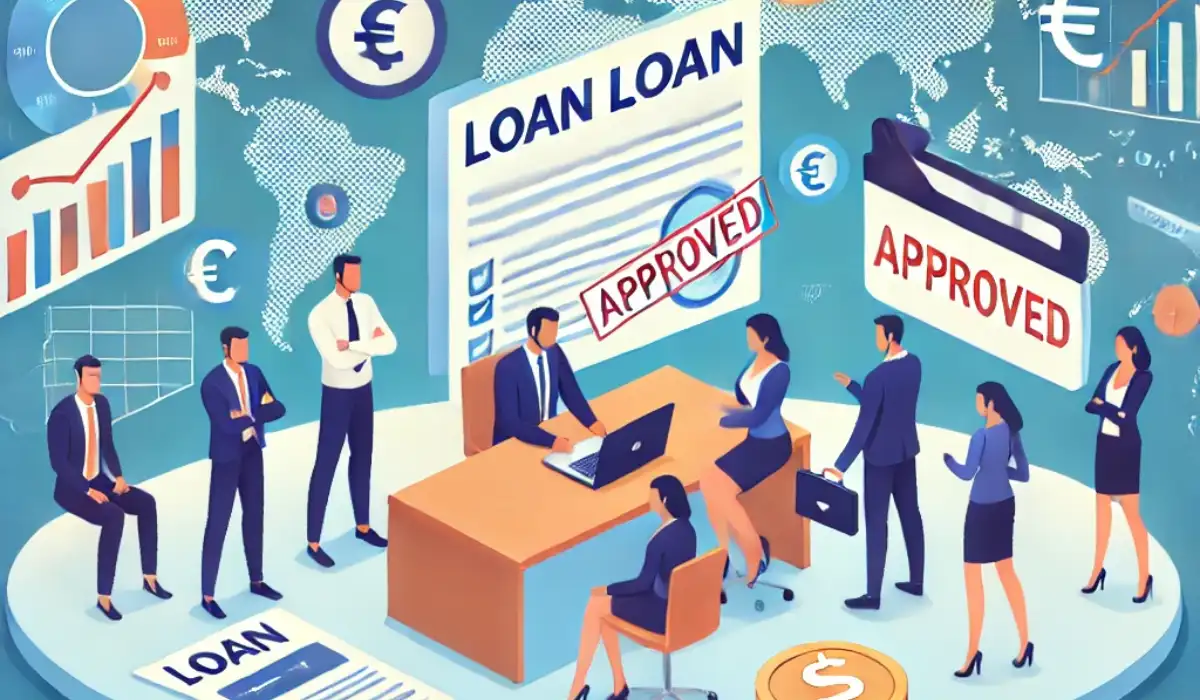Discover the top international business lenders to meet your global financing needs. Learn how to choose the right partner for your growth.
Starting or growing a business often requires a financial boost, and for many business owners, that means securing a bank loan or exploring international financing options. But how exactly do you get a bank loan for a business? If you’re new to the process, it can seem like a lot to handle. Don’t worry – we’ll walk through each step so you can feel prepared and confident. Whether you’re after a small business loan, a loan for specific business assets, or just want a line of credit, this guide covers what you need to know.
What is a Bank Loan for a Business?
A bank loan for a business is money that you borrow from a financial institution to help fund business needs. International bank loans, in particular, are significant for financing large businesses, especially for capital-intensive projects across various industries. This might include things like expanding operations, buying new equipment, hiring staff, or covering day-to-day expenses. Unlike a personal loan, a business loan is specifically for business purposes, and the bank expects that the funds will be used to help the business grow.

- Amount = $5,000 to $500,000
- Loan Term = 4 to 24 months
- Interest Rate = 1.11%
4.8
editorial team. We score based on factors
that are helpful for consumers, such as
how it affects credit scores, the rates and
fees charged, the customer experience,
and responsible lending practices.
- Min. Amount = $10,000
- Max Amount = $500,000
- APR = Factor rate starting at 1.11%
4.8
editorial team. We score based on factors
that are helpful for consumers, such as
how it affects credit scores, the rates and
fees charged, the customer experience,
and responsible lending practices.
Best for large business loans

- Loan Amount = $25,000 - $3,000,000
- $10,000 in Monthly Rev
- No minimum credit score requirement
4.9
editorial team. We score based on factors
that are helpful for consumers, such as
how it affects credit scores, the rates and
fees charged, the customer experience,
and responsible lending practices.
Best for large business loans

- Min Amount = $5,000 - 1,500,000
- APR range Not disclosed
- Minimum Credit Score 570
4.7
editorial team. We score based on factors
that are helpful for consumers, such as
how it affects credit scores, the rates and
fees charged, the customer experience,
and responsible lending practices.
Best for Small business loans

- Min Credit Score = 620
- Loan Amount = $10K-$5M
- Term = 6 months - 10 years
- APR = Variable
4.8
editorial team. We score based on factors
that are helpful for consumers, such as
how it affects credit scores, the rates and
fees charged, the customer experience,
and responsible lending practices.

- Check Your Eligibility
- Get $10K to $2M
- 24/7 Support
4.8
editorial team. We score based on factors
that are helpful for consumers, such as
how it affects credit scores, the rates and
fees charged, the customer experience,
and responsible lending practices.

- Amount = $10,000 to $1,000,000
- Factor Rate = Starting at 1.24
- Term = 2 to 12 months
4.7
editorial team. We score based on factors
that are helpful for consumers, such as
how it affects credit scores, the rates and
fees charged, the customer experience,
and responsible lending practices.

Why Do Businesses Need Bank Loans?
There are many reasons why business owners seek out bank loans:
- Expanding Operations: Need a bigger space? Bank loans can help you buy or rent a new property.
- Buying Equipment: Whether you’re in manufacturing or running a restaurant, buying equipment can be expensive.
- Working Capital: Sometimes, business owners need cash flow to handle everyday expenses.
- Large Projects: International investment loans are often used for long-term financing of extensive initiatives, facilitating the purchase and construction of significant fixed assets.
Bank loans give businesses the extra cash they need to grow, survive rough patches, expand or seize new investment and growth opportunities.
Related: How to Get a Bank Loan for a Business | Complete Guide
Types of Business Loans You Can Get from a Bank
Banks offer several types of loans tailored to different business needs. Here are some of the most common:
1. Term Loans
Term loans are a popular choice for businesses looking to finance large purchases or investments. These loans are typically repaid over a set period with fixed or variable interest rates.
2. Lines of Credit
Lines of credit provide businesses with flexible access to funds up to a certain limit. They are ideal for managing cash flow and covering short-term expenses.
3. Equipment Financing
Equipment financing is designed for businesses that need to purchase machinery or equipment. The equipment itself often serves as collateral for the loan.
4. Invoice Financing
Invoice financing allows businesses to borrow against their outstanding invoices. This type of loan helps improve cash flow by providing immediate access to funds.
5. Commercial Real Estate Loans
Commercial real estate loans are used to purchase, develop, or refinance commercial properties. These loans typically have longer repayment terms and may require a substantial down payment.
6. SBA Loans
SBA loans are partially guaranteed by the Small Business Administration and offer favorable terms for small businesses. They can be used for various purposes, including working capital, equipment purchases, and real estate.
7. Project Financing
Project financing is a critical means for large businesses to secure funding for capital-intensive projects. This type of financing often involves international bank loans and specialized financing services tailored for substantial investments across various industries. The increasing demand for expertise in navigating these complex financing options highlights the importance of project financing in today’s business landscape.
1. Term Loans
A term loan is a lump sum that you borrow and repay over a set period, with interest. It’s ideal for those companies financing major investments or acquisitions like purchasing equipment or real estate.
2. Business Lines of Credit
A line of credit lets you borrow money as you need it, up to a set limit. You only pay interest on the amount you use, making it perfect for covering short-term expenses or emergencies.
3. SBA Loans
Small Business Administration (SBA) loans are government-backed, making them easier to get for business owners who may not qualify for traditional loans. These loans can have lower interest rates and longer repayment terms.
4. Commercial Real Estate Loans
If you’re buying property for your business, a commercial real estate loan is the way to go. These loans are specifically for business properties and often come with competitive interest rates.
5. Equipment Loans
Equipment loans are used to make companies buy machinery, vehicles, or other equipment. The equipment itself typically serves as collateral, making it a good option if you need to upgrade your infrastructure, facilities or business assets.

- Amount = $5,000 to $500,000
- Loan Term = 4 to 24 months
- Interest Rate = 1.11%
4.8
editorial team. We score based on factors
that are helpful for consumers, such as
how it affects credit scores, the rates and
fees charged, the customer experience,
and responsible lending practices.
- Min. Amount = $10,000
- Max Amount = $500,000
- APR = Factor rate starting at 1.11%
4.8
editorial team. We score based on factors
that are helpful for consumers, such as
how it affects credit scores, the rates and
fees charged, the customer experience,
and responsible lending practices.
Best for large business loans

- Loan Amount = $25,000 - $3,000,000
- $10,000 in Monthly Rev
- No minimum credit score requirement
4.9
editorial team. We score based on factors
that are helpful for consumers, such as
how it affects credit scores, the rates and
fees charged, the customer experience,
and responsible lending practices.
Best for large business loans

- Min Amount = $5,000 - 1,500,000
- APR range Not disclosed
- Minimum Credit Score 570
4.7
editorial team. We score based on factors
that are helpful for consumers, such as
how it affects credit scores, the rates and
fees charged, the customer experience,
and responsible lending practices.
Best for Small business loans

- Min Credit Score = 620
- Loan Amount = $10K-$5M
- Term = 6 months - 10 years
- APR = Variable
4.8
editorial team. We score based on factors
that are helpful for consumers, such as
how it affects credit scores, the rates and
fees charged, the customer experience,
and responsible lending practices.

- Check Your Eligibility
- Get $10K to $2M
- 24/7 Support
4.8
editorial team. We score based on factors
that are helpful for consumers, such as
how it affects credit scores, the rates and
fees charged, the customer experience,
and responsible lending practices.

- Amount = $10,000 to $1,000,000
- Factor Rate = Starting at 1.24
- Term = 2 to 12 months
4.7
editorial team. We score based on factors
that are helpful for consumers, such as
how it affects credit scores, the rates and
fees charged, the customer experience,
and responsible lending practices.
6. Business Credit Cards
Though not technically a loan, a business credit card is another way to have easy access to funds. It’s ideal for smaller purchases and can help with cash flow in between larger expenses.

Steps to Apply for a Business Loan
Ready to see international business lenders get started? Here’s a step-by-step guide to help you apply for a bank loan for the new markets for funding your business.
Step 5: Compare Interest Rates and Loan Terms
When comparing interest rates and loan terms, consider the role of the Export Import Bank in providing competitive financing options. They offer customized financing programs and financial products tailored for exporters, which can help improve relationships with foreign suppliers and expand your market presence.
Step 1: Understand Your Loan Needs
Think about how much money you need, why you need it, and how long you’ll need to pay it back. Being clear about your loan amount and purpose will make it easier to find the right loan.
Step 2: Check Your Business and Personal Credit Scores
Banks look at your international business credit score and personal credit score to assess your creditworthiness. If your business is new, the bank might place more emphasis on your personal credit than international business’ score. The higher your credit score, the better your chances of approval and securing lower interest rates.
Step 3: Prepare Your Business Plan
Your business plan is like a roadmap for the bank to see how your business will use the loan to expand and grow. Include information about your market, your target audience and clients, and your financial projections. A solid business and finance plan increases lender confidence.
Step 4: Gather Financial Documents
Banks need to see financial proof that your company or business is stable and can repay the loan. Documents like tax returns, bank statements, balance sheets, and income statements will be required. Make sure everything is up-to-date and organized.
Step 5: Compare Interest Rates and Loan Terms
Not all bank loans are the same. Compare interest rates, loan terms, and fees from different banks to find the best fit. Some banks may offer competitive interest rates or flexible terms, so take your time to choose wisely.
Step 6: Complete the Loan Application
Fill out the loan application with accurate information. Any errors can delay your approval process, so double-check everything before submitting.
Step 7: Submit Your Application and Wait for Approval
After submitting your application, the bank’s loan officer will review it. They might call you with questions or request additional documents. The approval process can take anywhere from a few days to several weeks, depending on the type of loan and your bank’s procedures.
What Banks Look For in a Business Loan Application
Understanding what banks consider in your loan application can improve your chances of approval. Including details about your export-import operations is crucial, as it demonstrates your business’s ability to handle international trade and optimize operational capabilities.
1. Credit History
Banks will look at your credit report to check your payment history, debts, and any red flags. A good credit score signals to banks that you’re a responsible borrower.
2. Cash Flow
Cash flow shows whether your business generates enough income to repay the loan. Banks want to see steady income, so they know you’ll be able to make monthly payments.
3. Collateral
For secured loans, you may need collateral like property or equipment. Collateral lowers the lender’s risk and can make it easier for a company or you to get the financing approved.
4. Business Age and Stability
Lenders prefer established businesses, as they’re seen as more reliable. New businesses can still get loans but may have a harder time or less capital and face higher interest rates.
5. Industry Risks
Certain industries or services, like restaurants, can be seen as risky by lenders. Banks might adjust terms or interest rates based on the other costs and perceived risk of your industry or services.
Tips to Improve Your Chances of Getting Approved
If your credit isn’t great or you’re worried about qualifying, here are some tips to improve your odds of success:
- Build Your Credit Score: Pay bills on time, reduce debt, and check your credit report regularly.
- Show Strong Cash Flow: Maintain steady income and limit large expenses before applying.
- Prepare a Detailed Business Plan: A well-thought-out business plan shows you’re serious about your business and its growth.
- Offer Collateral: Collateral reduces the lender’s risk and can make approval easier.
Alternative Financing Options for Small Business Owners
If a traditional bank loan doesn’t work for you, don’t worry. There are other ways to finance your business:
Online lenders offer a variety of loan products that can be more accessible than traditional bank loans. Additionally, businesses in developing regions, including Latin America, can often obtain international bank loans on more favorable terms compared to local financial institutions, facilitating their investment projects.
Online Lenders
Online lenders are known for their faster approval process and flexibility. While their interest rates can be higher, they’re often easier to qualify for.
Small Business Grants
Grants are funds you don’t have to repay. They’re competitive, but worth considering if you meet the criteria.
Crowdfunding
Platforms and organizations like Kickstarter let you make projects and raise small amounts of money from a large group of people. It’s a unique way to fund projects for your business without taking on debt.
How Much Can You Borrow for a Bank Loan?
The loan amount you qualify for depends on your credit, cash flow, investment amount, and business financials. Small business owners often borrow anywhere from $5,000 to over $500,000, depending on their funding and financing needs and eligibility.
Common Questions About Business Loan Repayment
Repayment terms vary, but most business loans require monthly payments. Some business loans, like SBA loans, may offer extended terms up to 25 years, making monthly payments more manageable.


 Read More
Read More 





One Response
WARM GREETING AND BEST WISHES OF THE TIME TO THE ENTIRE TEAM AND GROUP MEMBERS.
WE SUBMITTED OUR HIGHLY PROFITABLE PROJECTS SUMMRIES AND OUR SIGNED SALES AND PURCHASE CONTRACT AGREEMENTS WITH GOVERNMENTS AND BIG GLOBAL COMPANIES TO SUPPLY PETROLEUM PRODUCTS, GOLD, METAL PRODUCTS AND VITAL COMMODITIES INCLUDING SUGAR.
THE BANK WHICH RECEIVED OUR PROJECTS SUMMARIES AND COPIES OF OUR SIGNED CONTRACT AGREEMENTS, CONDUCTED DUE DILIGENCE AND AGREED TO ACCEPT A CASH OR ASSET BASED BANK GUARANTEE AND APPROVED A LOAN OF OVER 500 MILLIONS EUROS. HOWEVER, BEFORE RECEIVING THE LOAN IN OUR ACCOUNT, WE HAVE TO ISSUE ACCEPTABLE BANK GUARANTEE OR A FINANCIAL RISK COVERAGE INSURANCE SURETY BOND TO THE LENDER.
WE ALSO HAVE TO AUTHENTICATE OUR COMPANY AND THE LOAN CONTRACT AGREEMENT DOCUMENTS IN NOTARY, PUBLIC, IN CHAMBER OF COMMERCE, IN CONCERNED MINISTRIES AND TO FINALLY GET STAMPED AT THE COURT.
THEN WE TRAVEL TO THE LENDER’S COUNTRY TO LEGALIZE THE ENTIRE DOCUMENTS THAERE AND TO OPEN A BANK ACCOUNT IN OUR COMPANY NAME IN THE LENDING BANK AND PUT SOME AMOUNT OF BALANCE IN THIS NEWLY OPENED BANK ACCOUNT TO RECEIVE THE LOAN PROCEEDS IN TO IT.
IN ORDER TO ACCOMPLISH THE ABOVE TASKS AND TO FULFIL OUR LENDER’S REQUIREMENTS, WE ARE HEREBY ASKING YOUR KIND COOPERATION AND ASSISTANCE IN FACILITATING A SHORT TERM BRIDGE LOAN OF $3,000,000 TO $5,000,000.00.
SINCE OUR NEED IS VERY URGENT WE ARE WILLING AND HAPPY TO PAY A 3% TO 4% INTEREST EVERY MONTH FOR 120 DAYS TO 180 DAYS MAXIMUM.
YOUR EXPECTED SUPPORT IS TO EXPLAIN OUR NEED TO THE POTENTIAL LENDERS AND CONNECT ME TO THEM WHEN THEY ARE READY TO SIGN THE LOAN CONTRACT AGREEMENT. WE CAN ISSUE A LEASED AND FULLY CASH BACKED SBLC FOR 180 DAYS TO OUR LENDERS OF THE $5 MILLION. ON THE TOP OF THAT AND TO BE DOBLE SECURED, THE LENDER CAN BUY A FINANCIAL RISK COVERAGE INSURANCE SURETY BOND BY DEDUCTING FROM THE LOAN PROCEEDS THAT THEY ARE GIVING ME. THEN THERE WILL BE NO ROOM FOR A RISK OR FOR ANY LOSS OF THE LOAN MONEY. IF YOU ARE STILL IN NEED I AM MORE THAN HAPPY TO GIVE ADDITIONAL INFORMATION IN THIS REGARD.
WITH VERY BEST REGARDS,
FIKERESELASSIE AYELE, CEO, GRACE GLOBAL PETROL, GOLD & METAL TRADING FZE